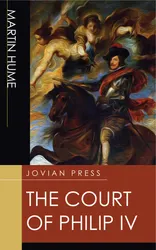"I lighted upon great files and heaps of papers and writings of all sorts.... In searching and turning over whereof, whilst I laboured till I sweat again, covered all over with dust, to gather fit matter together ... that noble Lord died, and my industry began to flag and wax cold in the business."
Thus wrote William Camden with reference to his projected life of Lord Burghley, which was never written; and the words may be applied not inappropriately to the present book and its writer. Some years ago I passed many laborious months in archives and libraries at home and abroad, searching and transcribing contemporary papers for what I hoped to make a complete history of the long reign of Philip IV., during which the final seal of decline was stamped indelibly upon the proud Spanish empire handed down by the great Charles V. to his descendants. I had dreamed of writing a book which should not only be a social review of the period signalised by the triumph of French over Spanish influence in the civilisation of Europe, but also a political history of the wane and final disappearance of the prodigious national imposture that had enabled Spain, aided by the rivalries between other nations, to dominate the world for a century by moral force unsupported by any proportionate material power.
The sources to be studied for such a history were enormous in bulk and widely scattered, and I worked very hard at my self-set task. But at length I, too, began to wax faint-hearted; not, indeed, because my "noble Lord had died"; for no individual lord, noble or ignoble, has ever done, or I suppose ever will do, anything for me or my books; but because I was told by those whose business it is to study his moods, that the only "noble Lord" to whom I look for patronage, namely the sympathetic public in England and the United States that buys and reads my books, had somewhat changed his tastes. He wanted to know and understand, I was told, more about the human beings who personified the events of history, than about the plans of the battles they fought. He wanted to draw aside the impersonal veil which historians had interposed between him and the men and women whose lives made up the world of long ago; to see the great ones in their habits as they lived, to witness their sports, to listen to their words, to read their private letters, and with these advantages to obtain the key to their hearts and to get behind their minds; and so to learn history through the human actors, rather than dimly divine the human actors by means of the events of their times. In fact, he cared no longer, I was told, for the stately three-decker histories which occupied half a lifetime to write, and are now for the most part relegated, in handsome leather bindings, to the least frequented shelves of dusty libraries.
I therefore decided to reduce my plan to more modest proportions, and to present not a universal history of the period of Spain's decline, but rather a series of pictures chronologically arranged of the life and surroundings of the "Planet King" Philip IV.—that monarch with the long, tragic, uncanny face, whose impassive mask and the raging soul within, the greatest portrait painter of all time limned with merciless fidelity from the King's callow youth to his sin-seared age. I have adopted this method of writing a history of the reign, because the great wars throughout Europe in which Spain took a leading part, under Philip and his successor, have already been described in fullest details by eminent writers in every civilised language, and because I conceive that the truest understanding of the broader phenomena of the period may be gained by an intimate study of the mode of life and ruling sentiments of the King and his Court, at a time when they were the human embodiment, and Madrid the phosphorescent focus, of a great nation's decay.







